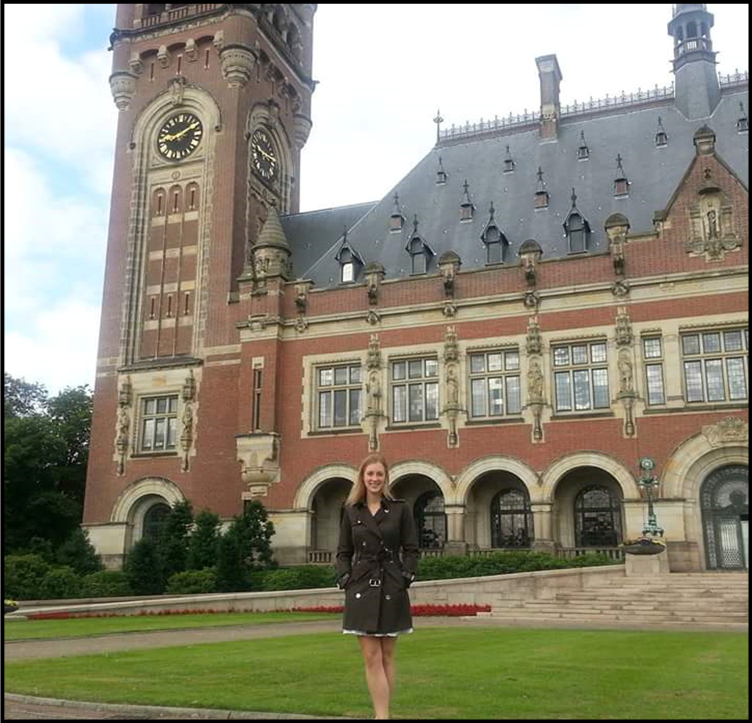By: Olivia Espy
Due the continuing generosity of Washington University School of Law and the Dagen-Legomsky Fellowship, I attended the Hague Academy of International Law on Public International Law this summer in The Netherlands. It was an experience I will never forget.
 The Hague Academy of International Law is an institution for teaching and research in public and private international law, with the aim of furthering the scientific study of the legal aspects of international relations. Such a lofty mission statement goes hand in hand with the Academy’s impressive history. The idea of creating an Academy of International Law was first raised at the Hague Conference of 1907 and ultimately implemented through the generous donations of Tobias Asser and the Carnegie Endowment for Peace. Fittingly, the Academy is held in the gorgeous and historic Peace Palace, or “Vredespaleis”, which is often called the seat of international law because it houses both the International Court of Justice (ICJ) and the Permanent Court of Arbitration (PCA). The Academy currently coordinates two three-week courses, one on public and one on private international law. Each course has a general lecture that runs the entirety of the three-weeks with six additional thematic lectures, each spanning the course of a week. The lectures are in turn supplemented with seminars, and for those seeking an even more advanced immersion in the subjects, a directed studies program.
The Hague Academy of International Law is an institution for teaching and research in public and private international law, with the aim of furthering the scientific study of the legal aspects of international relations. Such a lofty mission statement goes hand in hand with the Academy’s impressive history. The idea of creating an Academy of International Law was first raised at the Hague Conference of 1907 and ultimately implemented through the generous donations of Tobias Asser and the Carnegie Endowment for Peace. Fittingly, the Academy is held in the gorgeous and historic Peace Palace, or “Vredespaleis”, which is often called the seat of international law because it houses both the International Court of Justice (ICJ) and the Permanent Court of Arbitration (PCA). The Academy currently coordinates two three-week courses, one on public and one on private international law. Each course has a general lecture that runs the entirety of the three-weeks with six additional thematic lectures, each spanning the course of a week. The lectures are in turn supplemented with seminars, and for those seeking an even more advanced immersion in the subjects, a directed studies program.
This year, the general lecture was given by Professor Tullio Treves, from the State University of Milan, and focused on the expansion of international law. The thematic lectures ranged from the Forced Movement of Persons by Professor Jaime Ruiz de Santiago, former United Nations High Commissioner for Refugees (UNCHR) representative, to Unconstitutional Changes of Government and International Law by Professor Rafâa Ben Achour, Judge at the African Court on Human and Peoples’ Rights. In addition to the venerable faculty, the real intangible value of the course is interaction with individuals of such diverse backgrounds, united by a common interest. There were over 340 participants, representing 86 nationalities. Many are active in the legal field, a number are pursuing PhDs in the social sciences, and a few hold diplomatic or political positions in their respective countries. At the Academy there is no such thing as one official language – lectures are held in both French and English – and a polyglot would be in pleasant company.
The lectures and seminars are supplemented with guest lectures, embassy tours, and visits to the major international courts such as the International Criminal Tribunal for the former Yugoslavia (ICTY) and the International Criminal Court (ICC). Judge Sanji Mmasenono Monageng from the ICC spoke of her experience as a female black lawyer and her almost constant quest for justice. Deputy Secretary-General and Principle Legal Counsel of the PCA, Mr. Brooks Daly, spoke of the operation of the PCA as well as the possible causes and consequences of the recent uptick in international arbitration cases. It was particularly striking to learn that of the more than twenty professors and guest lectures, including multiple Judges on the ICJ, over a third attended the Academy at one point in time. I realized that the men and women seating around me would, in all likelihood, be the next generation of international jurists.
During my time at the Academy, I visited the Chilean Embassy. I have never before had the opportunity to discuss a major legal case with an ambassador, and it is an experience that still resonates. Another highlight of the course was meeting Judge Peter Tomka, former president of the ICJ, who read the judgment concerning the maritime dispute between Peru and Chile before the ICJ in 2014. Additionally, I was able to meet and speak with both Peru’s legal counsel, Professor Treves, and Chile’s legal counsel, current ICJ Judge James Richard Crawford. Having grown up in Chile, I followed this case with attention and it was wonderful to have the opportunity to speak directly with the protagonists.
The Hague Academy of International Law was an incomparable experience, both academically and personally, and one that will continue to reverberate over time.
